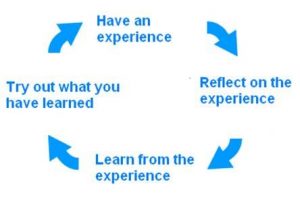Reflection
Reflection is a key element of the learning process. It involves the processes of examining an event or an experience; looking back, thinking about what happened, why it happened, and considering whether you would do anything differently next time.
The Cycle of Learning

The questioning aspect of reflection is similar to the questioning process in critical thinking which includes asking questions such as Why? Who? What? Where? When? How? What if? What next? Where keeping a reflective log or diary is specifically part of your course you may find the process referred to as ‘critical reflective practice’.
Kolb (1984) suggested a learning cycle which can be portrayed visually as in in the diagram below. The cycle shows the important role reflection plays in the learning process:
- Have an experience
- Reflect on the experience
- Learn from the experience
- Try out what you have learned
- Repeat…
When you have undertaken any kind of learning activity for example attending a lecture, seminar or tutorial, reading and taking notes or writing an assignment, it can be useful to take the time to reflect. It might help to ask yourself some questions, for example:
- What do I know now that I did not know before?
- How can I use what I have learned in a different context?
- What will I do differently next time?
The asking of questions to aid reflective practice is often called ‘deep reflection’.
There are two type of questions; ‘closed’ and ‘open’ questions:
- A closed question can be answered with ‘Yes’ or ‘No’ which doesn’t tell us any other information. An example of a closed question is ‘Did you learn something?
- An open question is one where we have to think more deeply about the issues involved for example ‘Describe some ways in which you feel you learned something.’
Questions for deep reflection
Single questions do not support the processes of deep reflection as much as a group of questions. A question which begins with ‘What…? may give us some information but even more will be gained by adding ‘How…?’ and ‘Why…?’.
- What did I actually achieve with this piece of work?
- Which were the most difficult parts, and why were they difficult for me?
- Which were the most straightforward parts, and why did I find these easy?
- How well do I think I achieved the intended learning outcomes for this task?
- Where could I have improved my achievement?
- Why didn’t I improve it at the time?
- What did I find the greatest challenge in doing this work?
- Why was this a challenge to me?
- To what extent do I feel I have met this challenge?
- What can I do to improve my performance when next meeting this particular sort of challenge?
It is important when writing an assignment to build in time for reflection. For example, when you have completed the first draft of an assignment, take the time to really think about what you have written for example:
- Have I answered the question?
- Does the assignment flow?
- Is the assignment structured logically?
- Does it have a clear beginning, middle and end?
This reflective process may take a couple of days and will enable you to stand back and take stock. You may find that some of your best reflection will happen when you least expect it, for example, in the shower or before you fall asleep, so where practical, always have a pen and paper handy!